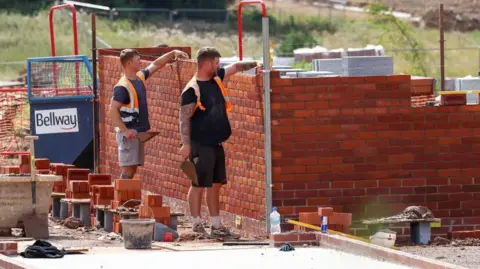Labour's plans are not a quick fix for UK economy
 Getty Images
Getty ImagesThe King’s Speech seeks to fix some of the plumbing, wiring and foundations of the economy to “get Britain building”.
It will take well into next year before we see any impact on economic growth from these plans.
In fact, the primary piece of legislation announced by His Majesty is to promote “economic stability”. This is noteworthy. Stability is not something that normally needs legislating for, but something which would be taken for granted in the UK.
The plans outlined include a lot of fiddly changes to how the government makes big decisions on planning, infrastructure, housing and transport. The bottom line is to give private investors more certainty about the economy and about policy.
The “Budget Responsibility Bill”, for example, is an elaborate way of saying there will never be another disastrous Liz Truss mini-Budget moment.
No future chancellor will be able to wave away the judgement of the government’s independent financial forecaster the Office for Budget Responsibility (OBR) as occurred in late 2022, when Truss announced £45bn in unfunded tax cuts.
The hope is that this will be such a rock of credibility and stability that investment into the UK will boom, and borrowing rates for householders, businesses and the government itself will fall back and not go back up again. Internally they call this “fixing the foundations”.
The OBR’s role in judging the affordability of every single policy, elsewhere in the speech, is now hard-wired. It also has an immediate role in judging whether all the other policies announced actually promote growth. This is the most power the OBR has ever had and gives it huge influence over this government's policies.
Is this transformative? The government argues that stability itself is almost revolutionary after several years of rolling chaos. But does the chancellor really need legislation to prevent her from doing a Liz Truss?
The really big consequence of this approach is to point to a moment this summer when the OBR will decide whether all these reforms actually will boost growth.
It has previously given credit to policies that it expects to boost the economy, for example factoring in former chancellor Jeremy Hunt’s childcare policy into its growth forecasts.
If the OBR does this again for Labour’s planned draft laws then it will help “improve the so called trade-offs” and there will be less pressure to cut spending or raise taxes.
If the OBR does not believe Labour’s plans will boost growth significantly then it’s difficult to see how it can avoid raising taxes or detailing spending cuts at the forthcoming Autumn Budget and Spending Review.
The government is using its large landslide majority to push through some politically painful changes that should boost growth longer term.
It will be a wait to see if it works, and it’s currently putting a lot of emphasis on measures which may take a long time to deliver.
